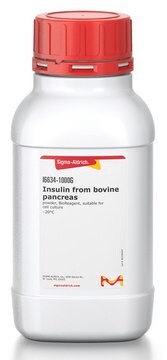60220
Potassium phosphate monobasic
buffer substance, anhydrous, puriss. p.a., ACS reagent, reag. ISO, reag. Ph. Eur., 99.5-100.5%
Synonym(s):
Monopotassium phosphate, Potassium dihydrogen phosphate, prim.-Potassium phosphate
About This Item
Recommended Products
grade
ACS reagent
anhydrous
puriss. p.a.
Agency
reag. ISO
reag. Ph. Eur.
Assay
99.5-100.5%
form
crystalline
impurities
≤0.001% total nitrogen (N)
loss
≤0.2% loss on drying, 105 °C
pH
4.2-4.5 (20 °C, 5%)
pKa (25 °C)
(1) 2.15, (2) 6.82, (3) 12.38 (phosphoric acid)
mp
252.6 °C (lit.)
solubility
water: 0.5 g/10 mL, clear, colorless to light yellow
density
2.338 g/mL at 25 °C (lit.)
anion traces
chloride (Cl-): ≤5 mg/kg
sulfate (SO42-): ≤30 mg/kg
cation traces
As: ≤0.5 mg/kg
Ca: ≤10 mg/kg
Cd: ≤5 mg/kg
Co: ≤5 mg/kg
Cr: ≤15 mg/kg
Cu: ≤5 mg/kg
Fe: ≤5 mg/kg
Mg: ≤5 mg/kg
Mn: ≤5 mg/kg
Na: ≤50 mg/kg
Ni: ≤5 mg/kg
Pb: ≤5 mg/kg
Zn: ≤5 mg/kg
heavy metals: ≤0.001% (by ICP)
SMILES string
[K+].OP(O)([O-])=O
InChI
1S/K.H3O4P/c;1-5(2,3)4/h;(H3,1,2,3,4)/q+1;/p-1
InChI key
GNSKLFRGEWLPPA-UHFFFAOYSA-M
Looking for similar products? Visit Product Comparison Guide
General description
Application
- to prepare the working luminol solution to study the prooxidant activity in the chemiluminescent system luminol–H2O2
- in phosphate buffer saline (PBS) to culture embryonic stem cells (ESCs) and generate embryoid bodies
- in PBS to prepare polydimethylsiloxane (PDMS) substrate
Storage Class Code
11 - Combustible Solids
WGK
WGK 1
Flash Point(F)
Not applicable
Flash Point(C)
Not applicable
Certificates of Analysis (COA)
Search for Certificates of Analysis (COA) by entering the products Lot/Batch Number. Lot and Batch Numbers can be found on a product’s label following the words ‘Lot’ or ‘Batch’.
Already Own This Product?
Find documentation for the products that you have recently purchased in the Document Library.
Customers Also Viewed
Protocols
This application illustrate how Rutin can be determined in skin cream samples using a monolithic Chromolith® HighResolution RP-18 endcapped column with UV detection.
Our team of scientists has experience in all areas of research including Life Science, Material Science, Chemical Synthesis, Chromatography, Analytical and many others.
Contact Technical Service


